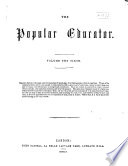 | Robert Potts - 1855 - 1050 pages
...that the evidence of the conclusion is manifest.—Dr Whewell. 199. The mathematical postulate, that " things which are equal to the same are equal to one another," is similar to the form of the syllogism in logic, which unites things agreeing in the middle term.—Bacon.... | |
 | Robert Potts - Scholarships - 1855 - 588 pages
...that the evidence of the conclusion is manifest.—Dr Whewett. 199. The mathematical postulate, that " things which are equal to the same are equal to one another," is similar to the form of the syllogism in logic, which unites things agreeing in the middle term.—Bacon.... | |
 | Robert Potts - Scholarships - 1855 - 588 pages
...that the evidence of the conclusion is manifest.—Dr Whewell. 199. The mathematical postulate, that " things which are equal to the same are equal to one another, 1 ' is similar to the form of the syllogism in logic, which unites things agreeing in the middle term.—Bacon.... | |
 | 1855 - 424 pages
...art equal to ta<A other. (Euclid 11, 5.) This is nothing more than an application of the axiom, that things which are equal to the same are equal to one another. And с : d : : m : n 2. If a :.* : : m : я And m : n : : с : d Cor. If a : 6 : : m : я l m : п>... | |
 | Edward Tagart - Hume, David, 1711-1776 - 1855 - 524 pages
...of nature and fact. In mathematical reasoning, no axiom is more constantly employed than this — ' things which are equal to the same are equal to one another.' Are the ideas of equality and inequality in the mind of a child before things have been observed, measured,... | |
 | Francis Bacon, Basil Montagu - 1857 - 612 pages
...similar to that of music termed the declining of a cadence. Again; the mathematical postulate, that "things which are equal to the same are equal to one another," is similar to the form of the syllogism in logic, which unites things agreeing in the middle term. Lastly:... | |
 | James Yates - Decimal system - 1858 - 100 pages
...differences must exist in all attempts to compare the lengths of different objects. Euclid's axiom, " Things, which are equal to the same, are equal to one another," is strictly true only of mathematical lines and other imaginary quantities. In practice it is sufficient,... | |
 | Religion - 1858 - 806 pages
...Christ was the " son of David ;" hence were Solomon and Christ the one or parallel characters, for things which are equal to the same are equal to one another. If the " last days " were to be the days of Christ, and if those were to be as the " days of Noah,"... | |
 | 1858 - 812 pages
...David;" Christ was the "son of David;" hence were Solomon and Christ the one or parallel characters, for things which are equal to the same are equal to one another. If the " last days " were to be the days of Christ, and if those were to be as the " days of Noah,"... | |
 | James McCosh - History - 1860 - 512 pages
...as the " Common Notions," so far as they relate to quantity, prefixed by Euclid to his Elements. " Things which are equal to the same are equal to one another." " If equals be added to equals, the wholes are equal." " If equals be taken from equals, the remainders... | |
| |